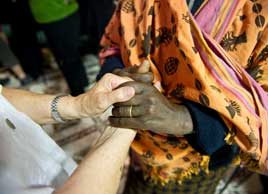Q&A: How to help moms in need
In honour of Mother’s Day, Best Health spoke to Ilana Landsberg-Lewis, executive director of the Stephen Lewis Foundation, about the organization’s efforts to support mothers and grandmothers in AIDS-ravaged Africa

Source: Web exclusive, May, 2011
The statistics are grim: According to data released by the United Nations in March 2011, there are 22.5 million people living with HIV in sub-Saharan Africa’60 per cent of whom are women.
Since 2003, the Stephen Lewis Foundation has funded more than 700 initiatives with community-based organizations in the African countries most affected by HIV/AIDS. This Mother’s Day, Best Health asked the organization’s executive director, Ilana Landsberg-Lewis, how we can honour motherhood by reaching out to women in need.
Best Health: How can mothers in Canada help mothers in Africa?
Ilana Landsberg-Lewis: All of us have incredibly rich lives’we’re not just mothers, we’re women. However you come to it, the reality is that these African communities’the real experts on what to do to ameliorate the impact of AIDS’need support, they need resources. And there are many ways to make that contribution; it doesn’t have to be through the Stephen Lewis Foundation. You can volunteer. You can raise awareness in your community, not just about AIDS but also of the resilience, the determination, the intelligence, and the sophistication and courage of communities fighting the AIDS pandemic in Africa. Fundraising is important because that’s what projects need.
BH: Grandmothers are raising their grandchildren who have been orphaned by HIV/AIDS. Through the Stephen Lewis Foundation’s Grandmothers to Grandmothers Campaign, Canadian grandmothers are supporting their African counterparts. How has this project helped communities?
IL: Hugely. Since 2006, Canadian grandmothers have raised more than $12 million for grassroots organizations run by and for grandmothers. These organizations do grief counselling, support groups, parenting workshops, elder abuse workshops and human-rights workshops for grandmothers, help grandmothers access pensions, and do work in income generation. These women are in their twilight years and didn’t expect to be raising youngsters again. Poverty is everywhere and hunger is rife, so there’s an enormous amount of work around food and nutrition and growing of kitchen gardens and repairing homes. Grandmothers now have some security and are getting some of those services through the funds that the grandmothers’ campaign has made available. The African grandmothers are incredibly empowered by the support they’ve had from their community organizations and now they’re able to go further. It’s quite marvelous.
BH: Can you share examples of ways in which Canadians are raising funds or otherwise helping to fight HIV/AIDS in Africa?
IL: People took on incredibly ingenious challenges as part of our year-round ‘A Dare to Remember’ campaign to stand in solidarity with Africans. For this campaign, you get people to pledge their support to you and raise money that goes directly to projects. Some people decided to run a marathon; high schools held a wake-a-thon where students stayed up all night; a grandmother who was terrified of flying got on a plane to visit her newborn grandchild. People do incredibly innovative things.
Related:
‘ How to start volunteering
‘ How volunteering can make you healthier and happier
‘ 5 ways giving is good for your health




